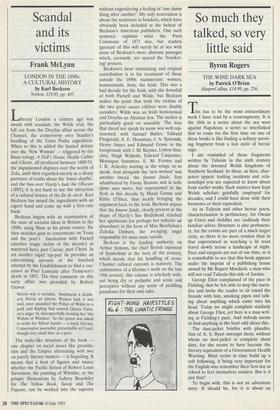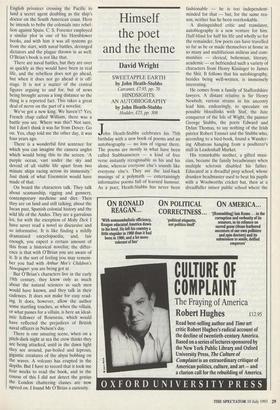So much they talked, so very little said
Byron Rogers
THE WINE DARK SEA by Patrick O'Brian HarperCollins, £1 4.99, pp. 256 his has to be the most extraordinary work I have read by a contemporary. It is the 16th in a series about the sea wars against Napoleon, a series so interlinked that to come for the first time on one of these books is like finding a solitary surviv- ing fragment from a lost cycle of heroic saga.
I am reminded of those fragments written by Taliesin in the sixth century about the doomed Welsh kingdoms of Southern Scotland. In these, as here, char- acters appear trailing incidents and rela- tionships you are expected to know about from earlier works. Such matters have kept Welsh scholars gainfully employed for decades, and I could have done with their footnotes or their equivalent.
As in Taliesin and other heroic poets, characterisation is perfunctory, for Owain ap Urien and Achilles are endlessly their familiar selves. Structure is also perfuncto- ry, for the events are part of a much larger cycle, so there is no more tension than in that experienced in watching a lit train travel slowly across a landscape at night. Pace and exegesis are not of our time, so it is remarkable to see that this book appears under the imprint of a publishing house owned by Mr Rupert Murdoch, a man who will not read Taliesin this side of Jordan.
George Eliot complained of the pace in Fielding, that he felt able to stop the narra- tive and invite the reader to sit round the fireside with him, smoking pipes and talk- ing about anything which came into his head. Today we might complain similarly about George Eliot, yet here is a man writ- ing at Fielding's pace. And nobody seems to find anything in the least odd about this.
The dust-jacket bristles with plaudits, that of A. S. Byatt amongst them, without whom no dust-jacket is complete these days, for she seems to have become the literary equivalent of a Government Health Warning. Most cycles in time build up a cult following, it being very important for the English who remember their first day at school to feel themselves insiders. But is it just that?
To begin with, this is not an adventure story. It should be, for it is about an English privateer crossing the Pacific to land a secret agent doubling as the ship's doctor on the South American coast. Here he intends to bribe the colonials into rebel- lion against Spain. C. S. Forester employed a similar plot in one of his Hornblower books, and with him it was all systems go from the start, with naval battles, deranged dictators and the plague thrown in as well. O'Brian's book is not like that.
There are naval battles, but they are over as quickly as they would have been in real life, and the rebellion does not go ahead, but when it does not go ahead it is off- stage. It is not a matter of the central figures arguing to and for, but of news being brought across a long distance so the thing is a reported fact. This takes a great deal of nerve on the part of a novelist.
We've got a new king. We haven't? Yes, French chap called William, there was a battle you see. Where was this? Not sure, but I don't think it was far from Dover. Go on. Yes, chap told me the other day, it was four years ago.
There is a wonderful first sentence for which you can imagine the camera angles which would bring this to the screen. 'A purple ocean, vast under the sky and devoid of all visible life apart from two minute ships racing across its immensity.' Just think of what Eisenstein would have made of that.
On board the characters talk. They talk about seamanship, rigging and gunnery, contemporary medicine and diet. Then they are on land and still talking, about the 'man past, Spanish colonial history and the wild life of the Andes. They are a garrulous lot, for with the exception of Moby Dick I have never read a novel so discursive and so informative. It is like finding a mildly dramatised encyclopaedia, and, fair enough, you expect a certain amount of this from a historical novelist; the differ- ence is that with O'Brian you are aware of it. It is the sort of feeling you may remem- ber you had with Arthur Mee's Children's Newspaper: you are being got at.
But O'Brian's characters live in the early 19th century, they know only as much about the natural sciences as such men would have known, and they talk in their cadences. It does not make for easy read- ing. It does, however, allow the author some startling touches, as when the villain, or what passes for a villain, is here an ideal- istic follower of Rousseau, which would have reflected the prejudices of British naval officers in Nelson's day.
There is one amazing scene, when on a pitch-dark night at sea the crew thinks they are being attacked, until in the dawn light they see around, par-boiled and leprous, gigantic creatures of the abyss bobbing on the waves. A volcano has erupted in the depths. But I have to record that it took me four weeks to read the book, and in the course of this I did not detect the genius the London chattering classes are now agreed on. I found Mr O'Brian a curiosity.



















































 Previous page
Previous page